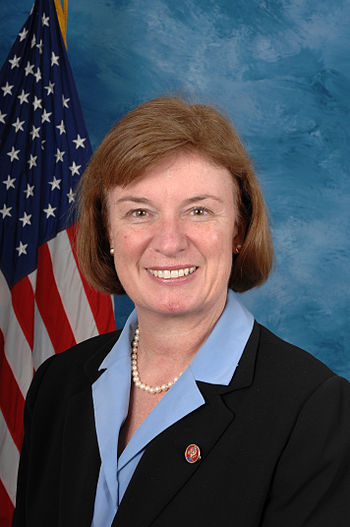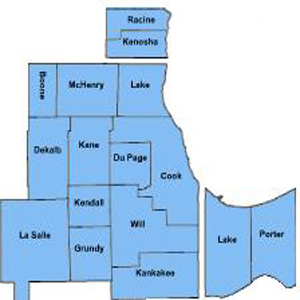From the Right: Quick Takes on the Illinois Elections
Sen. Dick Durbinâs election was close (by his margins), Democrat control of Congressional Delegation is weaker than we thought, is the Illinois 10th turning into the New Hampshire 1st are up today regarding Tuesdayâs Illinois Elections.
By Justin Shimko
Two days after the election and weâre still poring over the numbers to find nuggets of prognostication for the future of both parties, and the future of Illinois. Fortunately for most people, this will be one of the last days of discussion for 2014. Unfortunately, that just means everyone will start talking about the 2016 elections. Here are some quick takes from Tuesdayâs midterms.
Durbin Win Closest in Years

U.S. Senator Richard Durbin, of Illinois. (Photo credit: Wikipedia)
It seemed that Sen. Dick Durbin had the upper hand on this yearâs reelection the second polls closed in 2008. Not once did anyone indicate the Senate Majority Whip would have a tough time winning in this blue state, staying in Washington for another six years. And, after the polls closed Tuesday night, those indications proved somewhat right. But that doesnât mean there werenât signs that Durbin wasnât vulnerable.
Before provisional ballots are counted, Durbinâs win over Republican State Sen. Jim Oberweis stands at 53.1 percent to 43.1 percent. While many would assume that Durbin saying afterwards that this was his toughest election, he isnât that far off from the truth. That 10-point margin was the closest heâs had since his last Congressional election in 1994 and the 53.1 percent share of the vote is the lowest since his initial election to the House in 1983.
The 2014 vote shows that against a formidable, well-financed opponent, Durbin would have the same problems that Quinn ended up having. As it stands, Oberweis had a severe financial disadvantage, roughly at 4-1 when accounting for Super PAC spending on both sides, that hindered his ability to get the message out to the key voting blocs. If, instead, the NRSC and other supporters evened the fundraising for the election, we could very well be talking about Sen.-elect Jim Oberweis.
Democrats Donât Own The Illinois Control Like We Thought
When the dust settled on the 2012 election, Democrats retook control of the Illinois delegation to the House, going from 11 Republicans and eight Democrats to 12 seats for the Democrats and just six for Republicans. This was largely because of the new district lines that made it harder for Republicans to win in the state. The results of Tuesdayâs election may indicate that the Democrats can enjoy the advantage for the near future, with the Republicans only able to gain two seats, but there is great evidence that Republicans can recapture the advantage in 2018.
The Democrat advantage in the House largely relies on Chicago, where Republicans have a hard time winning more than a 20 percent share of the vote during any election. But the suburban areas around Chicago still holds large pockets of Republicans and moderates willing to vote against the Democrats when the right candidate comes along. What we saw in Lake County is that Rep. Brad Schneider won largely on the coattails of Obamaâs reelection, same goes for Rep. Bill Enyart. If, given enough funding and a strong enough candidate, Rep. Bill Foster could face a tough election in another midterm election. Given that the district swung for Bush in 2000 and 2004, this could also be a seat in play as soon as 2016 when Obama is no longer eligible to run.
Same goes for Illinoisâ 8th, where Tammy Duckworth easily beat Larry Kaifesh. After the high-dollar contentious battles in the 8th between Melissa Bean, Joe Walsh and Duckworth over the previous three cycles, this race was strikingly quiet. Kaifesh never raised the kind of money needed to battle Duckworth and outside groups saw no reason to get involved. Given the right kind of movement, or Duckworthâs possible run for the Senate, this seat could be ripe for Republicans soon enough.
Is Illinoisâ 10th Turning Into New Hampshireâs 1st?

, member of the United States House of Representatives. (Photo credit: Wikipedia)
Tuesdayâs nightâs Republican wave largely missed Illinois but one place where it did take hold was in the northeastern corner of the state where Bob Dold was able to reclaim his congressional seat over Brad Schneider. Shortly after Schneider conceded his election, pundits began to wonder if Schneider would run against Dold for a third time in 2016, when the voter turnout would likely favor the Democrat in the 10th District. If that does happen, and the race is as close as it was two years ago and Tuesday night, then donât be surprised if speculation would start on Dold running, again, come 2018. Sounds farfetched? Look to Americaâs northeastern corner where New Hampshireâs 1st District currently enjoys this back-and-forth contest.
In 2010, when the Republicans had their own midterm wave in the House, former-Manchester mayor Frank Guita upended Rep. Carol Shea-Porter with a 12-point margin. Two years later, Shea-Porter and Guinta faced off, again, with Shea-Porter edging the incumbent by three points. Tuesday night, the two once again tussled and, once again, the outcome reversed. There is no word on whether Shea-Porter will try to win the seat for a third time in 2016.
Justin Shimko is an award-winning writer and political analyst. He began as a reporter in his college days at the University of Oklahoma, writing for The Oklahoma Daily (rated as one of the best collegiate newspapers in the nation) and The Oklahoman, the statewide newspaper, winning awards from the CSPA and the Society of Professional Journalists. He later moved on to research and writing work for a number of political campaigns. His email is
[email protected]
Latest posts by Justin Shimko (see all)
Related
 Blog Posts
Blog Posts






From the Right: Quick Takes on the Illinois Elections
Sen. Dick Durbinâs election was close (by his margins), Democrat control of Congressional Delegation is weaker than we thought, is the Illinois 10th turning into the New Hampshire 1st are up today regarding Tuesdayâs Illinois Elections.
By Justin Shimko
Two days after the election and weâre still poring over the numbers to find nuggets of prognostication for the future of both parties, and the future of Illinois. Fortunately for most people, this will be one of the last days of discussion for 2014. Unfortunately, that just means everyone will start talking about the 2016 elections. Here are some quick takes from Tuesdayâs midterms.
Durbin Win Closest in Years
U.S. Senator Richard Durbin, of Illinois. (Photo credit: Wikipedia)
It seemed that Sen. Dick Durbin had the upper hand on this yearâs reelection the second polls closed in 2008. Not once did anyone indicate the Senate Majority Whip would have a tough time winning in this blue state, staying in Washington for another six years. And, after the polls closed Tuesday night, those indications proved somewhat right. But that doesnât mean there werenât signs that Durbin wasnât vulnerable.
Before provisional ballots are counted, Durbinâs win over Republican State Sen. Jim Oberweis stands at 53.1 percent to 43.1 percent. While many would assume that Durbin saying afterwards that this was his toughest election, he isnât that far off from the truth. That 10-point margin was the closest heâs had since his last Congressional election in 1994 and the 53.1 percent share of the vote is the lowest since his initial election to the House in 1983.
The 2014 vote shows that against a formidable, well-financed opponent, Durbin would have the same problems that Quinn ended up having. As it stands, Oberweis had a severe financial disadvantage, roughly at 4-1 when accounting for Super PAC spending on both sides, that hindered his ability to get the message out to the key voting blocs. If, instead, the NRSC and other supporters evened the fundraising for the election, we could very well be talking about Sen.-elect Jim Oberweis.
Democrats Donât Own The Illinois Control Like We Thought
When the dust settled on the 2012 election, Democrats retook control of the Illinois delegation to the House, going from 11 Republicans and eight Democrats to 12 seats for the Democrats and just six for Republicans. This was largely because of the new district lines that made it harder for Republicans to win in the state. The results of Tuesdayâs election may indicate that the Democrats can enjoy the advantage for the near future, with the Republicans only able to gain two seats, but there is great evidence that Republicans can recapture the advantage in 2018.
The Democrat advantage in the House largely relies on Chicago, where Republicans have a hard time winning more than a 20 percent share of the vote during any election. But the suburban areas around Chicago still holds large pockets of Republicans and moderates willing to vote against the Democrats when the right candidate comes along. What we saw in Lake County is that Rep. Brad Schneider won largely on the coattails of Obamaâs reelection, same goes for Rep. Bill Enyart. If, given enough funding and a strong enough candidate, Rep. Bill Foster could face a tough election in another midterm election. Given that the district swung for Bush in 2000 and 2004, this could also be a seat in play as soon as 2016 when Obama is no longer eligible to run.
Same goes for Illinoisâ 8th, where Tammy Duckworth easily beat Larry Kaifesh. After the high-dollar contentious battles in the 8th between Melissa Bean, Joe Walsh and Duckworth over the previous three cycles, this race was strikingly quiet. Kaifesh never raised the kind of money needed to battle Duckworth and outside groups saw no reason to get involved. Given the right kind of movement, or Duckworthâs possible run for the Senate, this seat could be ripe for Republicans soon enough.
Is Illinoisâ 10th Turning Into New Hampshireâs 1st?
, member of the United States House of Representatives. (Photo credit: Wikipedia)
Tuesdayâs nightâs Republican wave largely missed Illinois but one place where it did take hold was in the northeastern corner of the state where Bob Dold was able to reclaim his congressional seat over Brad Schneider. Shortly after Schneider conceded his election, pundits began to wonder if Schneider would run against Dold for a third time in 2016, when the voter turnout would likely favor the Democrat in the 10th District. If that does happen, and the race is as close as it was two years ago and Tuesday night, then donât be surprised if speculation would start on Dold running, again, come 2018. Sounds farfetched? Look to Americaâs northeastern corner where New Hampshireâs 1st District currently enjoys this back-and-forth contest.
In 2010, when the Republicans had their own midterm wave in the House, former-Manchester mayor Frank Guita upended Rep. Carol Shea-Porter with a 12-point margin. Two years later, Shea-Porter and Guinta faced off, again, with Shea-Porter edging the incumbent by three points. Tuesday night, the two once again tussled and, once again, the outcome reversed. There is no word on whether Shea-Porter will try to win the seat for a third time in 2016.
Justin Shimko
Latest posts by Justin Shimko (see all)
Share this:
Related